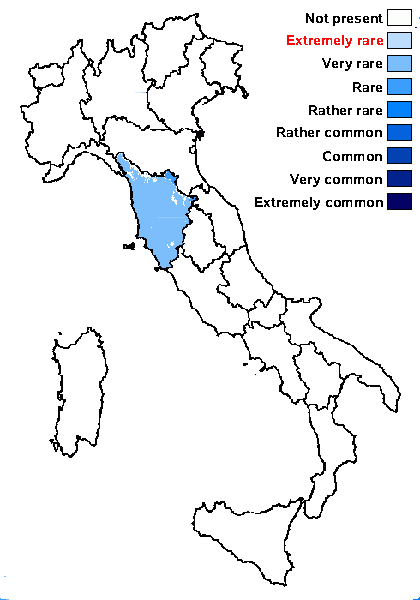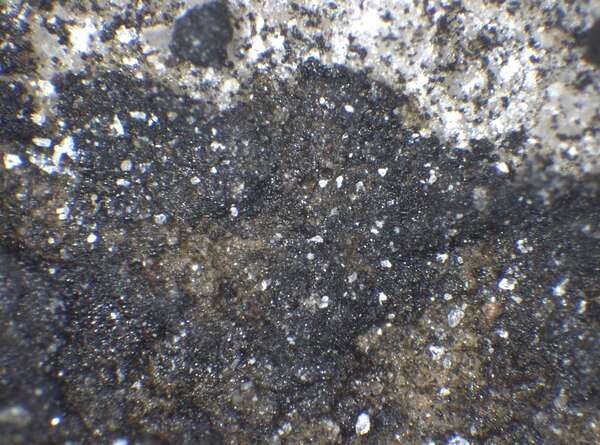Thelignya obtenebrans (Nyl.) M. Schultz
in Prieto & al., Studies in Mycology, 109: 624, 2024.. Basionym: Collemopsis obtenebrans Nyl. - Flora, 68: 39, 1885.
Synonyms: Psorotichia obtenebrans (Nyl.) Forssell
Distribution: C - Tosc (TSB 30615).
Description: Thallus crustose to crustose-placodioid, rimose-areolate, usually well delimited, often with radiating marginal lobes, homoiomerous, pseudoparenchymatous throughout, the hyphae 3-6 µm thick. Areoles 0.1-0.75 mm wide, flat, smooth, contiguous, black to dark grey when dry, dark olive-brown when wet, epruinose, not granulose, the peripheral ones often elongate and radiating. Apothecia formed from a spheroid tangle of generative hyphae with ascogones and trichogynes (no pycnoascocarps), at first immersed then sessile, 1-2 per areole, 0.2-0.4 mm across, with an initially punctiform, later expanded, concave, dark brown disc surrounded by a thick, smooth, epruinose thalline margin. Proper exciple poorly differentiated, cupuliform, formed by a few anastomosing hyphae; epithecium orange-brown, 7-15 µm high; hymenium colourless, 90-100 µm high; paraphyses branched and anastomosing, with cylindrical cells, 2-3 µm thick, only slightly constricted at septa; hypothecium colourless, 30-50 µm high. Asci 8-spored, narrowly cylindrical-clavate, with a very thin wall disintegrating or opening by apical ruptures, without apical amyloid structures, Lichina-type, 60-75 x 10-15 µm. Ascospores 1-celled, hyaline, ellipsoid to subglobose, 10-12(-14) x 6-8(-9) µm. Photobiont cyanobacterial chroococcoid, single-celled
with thin, yellowish brown gelatinous sheaths. Spot tests: all negative. Chemistry: without lichen substances. Note: a southern species of sunny calcareous rocks at relatively low elevations; perhaps related to Pterygiopsis affinis.
Growth form: Crustose
Substrata: rocks
Photobiont: cyanobacteria, filamentous (e.g. Nostoc, Scytonema)
Reproductive strategy: mainly sexual
On otherwise dry surfaces with short periods of water seepage after rain
Poorly known taxon in need of further study
Commonnes-rarity: (info)
Alpine belt: absent
Subalpine belt: absent
Oromediterranean belt: absent
Montane belt: absent
Submediterranean belt: rare
Padanian area: absent
Humid submediterranean belt: very rare
Humid mediterranean belt: very rare
Dry mediterranean belt: absent

Predictive model
Herbarium samples
Growth form: Crustose
Substrata: rocks
Photobiont: cyanobacteria, filamentous (e.g. Nostoc, Scytonema)
Reproductive strategy: mainly sexual
On otherwise dry surfaces with short periods of water seepage after rain
Poorly known taxon in need of further study
Commonnes-rarity: (info)
Alpine belt: absent
Subalpine belt: absent
Oromediterranean belt: absent
Montane belt: absent
Submediterranean belt: rare
Padanian area: absent
Humid submediterranean belt: very rare
Humid mediterranean belt: very rare
Dry mediterranean belt: absent

Predictive model
| Herbarium samples |



